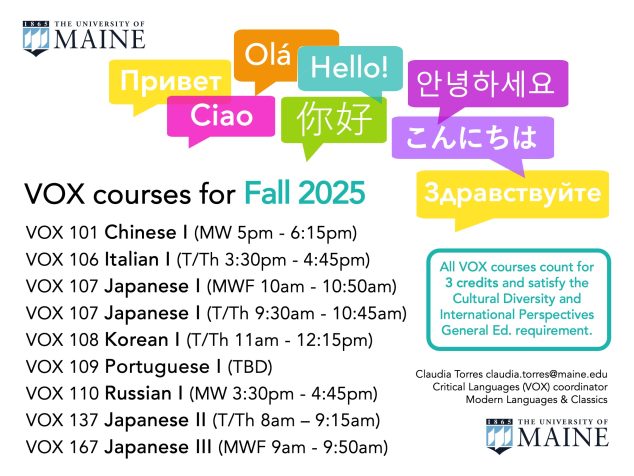VOX**
Critical Languages Program
Contact the Coordinator
To learn more about the Critical Languages/VOX program, please contact the coordinator:
207-581-2067
Critical Languages Program
201 Williams Hall
University of Maine
Orono, Maine 04469-5742
About the Critical Languages Program
This program uses a self-instructional method for language learning. The major responsibility belongs to the student, who works with a tutor-instructor who is a native speaker of the target language. The method used is loosely based on the one used by the Foreign Service Institute. It is effective because it requires active, committed learning by students. At the early stages of language acquisition, the most important thing is to practice, to overlearn material, to have accurate linguistic models, and to have appropriate, adequate materials. The Critical Languages Program has all of these features.
Students are expected to make full use of all the required course materials, which provide grammar explanations, vocabulary, and the opportunity to develop listening comprehension, all of which are intended to assist in the development of speaking skills. Students must listen to audio recordings and practice speaking outside of class to be fully prepared to participate in the practice sessions with the native speaker and achieve the desired oral proficiency outcome for the course.
Classes meet three hours (150 minutes) each week in small tutorials of four to eight students.
What do you learn in this program?
The focus of the self-instructional method is oral proficiency. While students may be exposed to the written language, writing and reading are not among the primary goals of the program.
Why does this method work?
The acquisition of a new language is a complex process, yet people do it all the time. Research shows that language learners must be active participants in the process. It may seem necessary to have the grammar explained at every step, but adult learners can obtain a good part of this information from the independent study of well-designed texts. What everyone needs is accurate, controlled, and frequent feedback in response to their performance. Students in Critical Languages must come to class prepared to speak, meaning that they have read, practiced, and listened to the material for several hours. Instructors use the target language exclusively, and consistently correct errors in the learners’ speech. Time is spent very efficiently because the groups are small, there is careful attention to linguistic performance, and guidance is personalized.
Why choose this method?
There is no single way to learn a language, just as there is no single type of learner. This program may not work for everyone, but it can work for almost anyone who truly wishes to learn a given language. An important factor is the motivation of the individual. Keep in mind why it is you wish to learn the language, because that will be your greatest motivator. Unlike other language classes, there are no regular written assignments or tests, which some students may use to keep themselves on track. This does not make the course easier or watered down; rather, it means that the student is responsible for his or her own progress.
The practice sessions are vital to learning because of the constant feedback they provide for self-assessment. The combination of self-instruction and work with a human being who knows the language allows for the development of proficiency. The use of various media appeals to different learning styles and enriches the language learning process, but interaction with others is a necessary component for real language learning to take place.
Which levels are offered?
Critical Language courses offer the beginning level, which will be two or three semesters, depending on the difficulty of the language and the time required to reach a certain level of proficiency. In some cases, we are able to offer courses at the intermediate level. Please check with the program coordinator about their availability. The offerings change by semester, so be sure to check the Course Listings to see which courses are being offered in the coming semester.
How is each course graded?
Fifteen percent of the final grade will be based on attendance, to be kept by the Instructor and 85% is based on the oral examination. During finals week, a 30-minute oral examination is conducted by an outside examiner, who works in conjunction with the program coordinator and the tutor-instructor in developing the exam. This grading format emphasizes learner outcomes.
By signing the enrollment form, students certify that they have read the program description and understand the course format and their responsibilities. A student who stops attending sessions or does not appear for the final exam will earn a failing grade. A grade of Incomplete may be given only under extraordinary circumstances and in accordance with departmental and university policy.
Semester schedule information
- Week 1: the course schedule is communicated to students
- Week 2: practice sessions (classes) begin
- Weeks 13 and 14: oral exams are arranged
- Week 15 (final exam period): oral exams
How to register and what to expect?
During preregistration, students request permission by completing an enrollment form, filling out a questionnaire, and leaving their schedule in 201 Williams Hall. We use the application to make sure you are enrolled in the appropriate level for your skill level and to arrange the schedule for TBD courses. We also like to be sure we have a way to contact you during the scheduling process. Permission is granted only when this information is received.
Practice session times are scheduled according to the instructor’s availability and taking into account the time that meets the needs of the majority of interested students and their schedules. In a few cases, practice sessions are set prior to registration.
Courses meet three hours per week in three 50-minute or two 75-minute sessions. Prior to each session, students should master the reading material completely and practice vocabulary and phrases orally. Class sessions are devoted to oral practice, and questions about the language should be kept to a minimum. Make use of your study time to prepare fully before the practice sessions. Attendance at every session is essential for your success in learning the language.
Preparation through self-study may average nine hours per week in addition to class time. The self-instructional approach is not a short-cut to learning a language and it does not make the course easier, but it does bring success.
What about texts and other materials?
Course materials can be purchased from the university bookstore (581-1700). Look for them under the VOX designators. Some textbooks have audio materials bundled with them.
What or how much material is covered?
A Critical Language course should cover the same amount of material (with respect to speaking) as in a traditional classroom. Sometimes it may cover more. Instructors are expected to maintain an appropriate speed and level of performance.
A brief recap:
- Become familiar with the program information here or through conversation with the program coordinator.
- Complete the enrollment form and questionnaire about your experience in the desired language, and provide the necessary schedule information. Submit it to the Department in 201 Williams Hall. These forms are available at the top of this page and may be submitted to the program coordinator electronically. If you submit your form after the recommended deadline and scheduling has begun, no accommodation can be made for your course schedule.
- Upon approval from the program coordinator, the Department of Modern Languages and Classics will register you.
- If you do not hear from the program coordinator, you can assume you have been granted permission and will be enrolled in the course you’ve selected.
- Be aware that classes with fewer than four students will not run.
A final word about language learning in general
Learning a language is like learning to play a musical instrument or becoming a skilled athlete: in all of these activities, a learner must perform and prepare extensively beforehand. Imagine coming to a concert or a play without knowing the music or the lines! And no athlete gets to play in a sporting event without having gone to practice. You must be an active participant in the learning process. There are no shortcuts or simple ways to learn another language, but organization, motivation, and open-mindedness to new ways of organizing reality, together with a willingness to take risks, go a long way in helping you progress toward your goal.
No prior experience is necessary to start a new language, but you should have a clear goal of what you want and are able to accomplish.

Enroll in a VOX course
Submit an enrollment form (see below) online or in person at 201 Williams Hall or by email to coordinator Claudia Torres.
Important:
- Search for VOX on UM Class Search to see what classes are being offered.
- Enroll as soon as possible, especially if your chosen VOX class is TBA and you have a tight schedule.
- All VOX courses focus on developing speaking skill and carry three credits.
- VOX classes with fewer than 4 students will not run.
- Classes have a maximum enrollment of 8 students.
- All VOX courses satisfy the Cultural Diversity and International Perspectives Requirements.
ENROLLMENT FORMS
Below is an Enroll now button to submit the online form, the link below that is if you prefer to fill it out and email it or drop it off in the office.

Enrollment form for VOX students
For course descriptions, see the Course Catalog.

VOX (Critical Languages Courses) have something to offer every major. The job market is a competitive place and employers are looking for skills that set candidates apart from the other applicants. Be the one who stands out with proficiency in a Critical Language.
